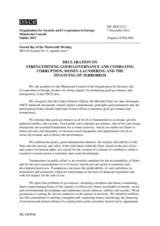
Countering the financing of terrorism

The OSCE supports its participating States with preventing and countering the financing of terrorism in full compliance with international law and human rights principles.
Quick links
Our work
Our thematic and programmatic focus areas
Stemming the flow of financial resources to terrorists and violent extremists has become a foundational element of international counter-terrorism strategies. This priority reflects the evolving and decentralized nature of the financing of terrorism, which is increasingly shaped by the use of emerging technologies and digital financial infrastructures. The rise of virtual assets, instant payment systems and online gaming environments has introduced new value transfer mechanisms that frequently outpace the ability of regulatory and compliance systems to adapt.
These technological developments, when combined with the use of traditional methods, such as banking channels and cash / hawalahawala
Informal value transfer system through a network of money brokers couriers, present significant challenges for public authorities and financial institutions seeking to detect and disrupt terrorism financing effectively. Thus, it is widely recognized that there is a need to strengthen national frameworks to counter the financing of terrorism and enhance national capacities to prevent terrorist groups from raising, moving and using funds for terrorist activities, in compliance with relevant international legal obligations, including human rights principles, Financial Action Task Forcestandards and OSCE commitments.
OSCE action to counter terrorist financing
In response to this, the OSCE Secretariat’s Transnational Threats Department, in collaboration with the United Nations Office on Drugs Crime’s Global Programme against Money Laundering, Proceeds of Crime and the financing of Terrorism[AN2] and together with OSCE field operations, implemented an advanced training programme on strengthening methodologies for financial investigations and inter-agency co-operation in countering the financing of terrorism, through tailored training-of-trainers.
The Department also supports the strengthening of public-private partnerships in countering the financing of terrorism by facilitating collaboration among government agencies, financial institutions, fintech companies, and other reporting entities. This includes accessing effective co-operation modalities and secure information-sharing mechanisms, all while ensuring alignment with human rights-based approaches.
Protecting the non-profit sector
Another key area of focus is enhancing co-operation between government and non-profit organizations to safeguard this sector against countering the financing of terrorism and ensure that measures are targeted and proportionate, and that governments do not shrink civic space through over-application of the Financial Action Task Force standards. To this end, the Transnational Threats Department delivers targeted support to assist participating States in meeting their obligations under Financial Action Task Force Recommendation 8, offering practical guidance on its implementation in accordance with international law, including human rights standards. Emphasis is placed on promoting measures that avoid unintended negative consequences for the non-profit organizations sector, and on fostering a consultative and inclusive dialogue between government authorities and non-profit organizations.
Drawing on lessons learned, an ongoing analysis of the evolving threat landscape as well as the continued support of our partners, the Department launched project ‘FOLLOW: Strengthening Capacities to Counter the Financing of Terrorism’. The project aims to continue to strengthen the capacities of OSCE participating States and Partners for Co-operation in preventing and countering the financing of terrorism.
Featured
Activities, news and other highlights

FOLLOW: Strengthening Capacities to Counter the Financing of Terrorism

Training Programme on Countering the Financing of Terrorism: A Year in Review – 2024

OSCE and EU support Central Asian states to safeguard non-profit organizations from abuse by terrorists
Resources
Official OSCE documents, publications and other manually selected resources


